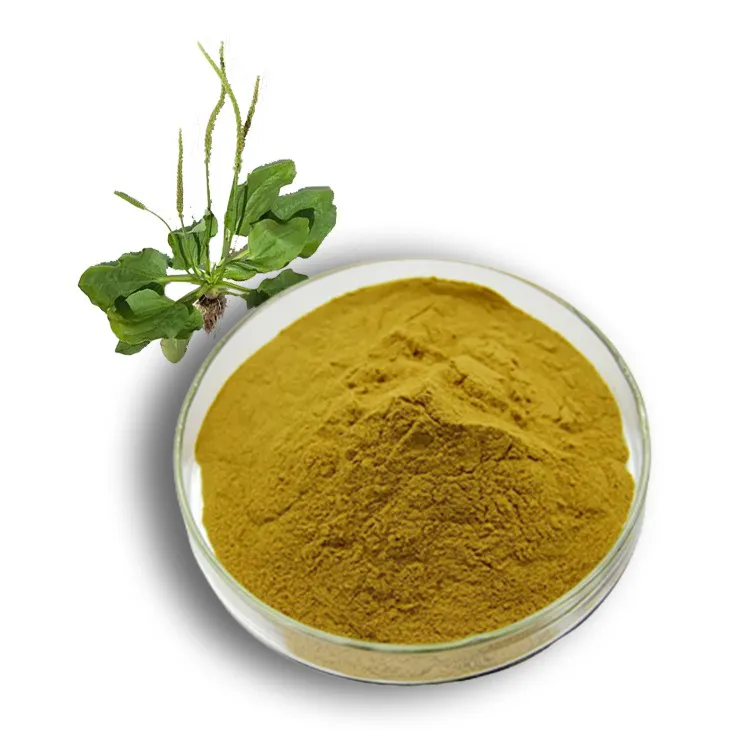- 0086-571-85302990
- sales@greenskybio.com
Is plantain extract beneficial for diabetes? Are these all safe and applicable for diabetic patients?
2024-11-14

1. Introduction
Diabetes mellitus is a chronic metabolic disorder that has reached epidemic proportions globally. Management of diabetes typically involves lifestyle modifications, including diet and exercise, along with pharmacological interventions. In recent years, there has been a growing interest in exploring the potential benefits of plant - based extracts for various health conditions, including diabetes. Plantago asiatica extract is one such extract that has drawn attention. This article aims to comprehensively analyze whether this extract is beneficial for diabetes and its safety for diabetic patients by considering aspects such as blood - sugar regulation, side - effects, and interactions with existing diabetes medications.

2. Blood - Sugar Regulation Potential
2.1. Mechanisms Involved
Some studies suggest that Plantago asiatica extract may play a role in blood - sugar regulation through multiple mechanisms. One proposed mechanism is its potential effect on carbohydrate metabolism. It may influence the enzymes involved in the breakdown and absorption of carbohydrates in the digestive tract. For example, it could potentially inhibit certain alpha - glucosidase enzymes, which are responsible for breaking down complex carbohydrates into simple sugars. By doing so, it may slow down the rate of glucose absorption into the bloodstream, thereby preventing rapid spikes in blood - glucose levels after a meal.
Another possible mechanism is related to its impact on insulin sensitivity. Insulin is a hormone that is crucial for regulating blood - sugar levels. In diabetic patients, especially those with type 2 diabetes, insulin resistance is a common problem. There is some evidence to suggest that Plantago asiatica extract may enhance insulin sensitivity in cells. This means that cells may be more responsive to insulin, allowing for better uptake of glucose from the blood. However, more research is needed to fully understand these mechanisms at the cellular and molecular levels.
2.2. Experimental Evidence
Several animal studies have provided some initial evidence regarding the blood - sugar - regulating potential of Plantago asiatica extract. In these studies, diabetic animal models (such as rats or mice with chemically - induced diabetes) were treated with the extract. The results showed that, in some cases, there was a significant reduction in fasting blood - glucose levels compared to the control group. Additionally, post - prandial (after - meal) blood - glucose levels also tended to be more stable in the animals treated with the extract.
However, it is important to note that animal studies have limitations when it comes to extrapolating results to humans. Human clinical trials are relatively scarce at present. A small - scale human pilot study reported some positive trends in blood - sugar control in diabetic patients who were supplemented with Plantago asiatica extract. But again, larger and more rigorous clinical trials are required to confirm these findings and to establish the optimal dosage and treatment duration for effective blood - sugar regulation.

3. Possible Side - Effects
3.1. Gastrointestinal Effects
One of the potential side - effects associated with Plantago asiatica extract may be related to the gastrointestinal tract. Since it may affect carbohydrate metabolism and enzyme activity in the digestive system, it could potentially cause some gastrointestinal discomfort. Some individuals may experience symptoms such as bloating, flatulence, or mild abdominal pain. These symptoms are more likely to occur if the extract is consumed in large amounts or if an individual has a particularly sensitive digestive system.
It is also possible that the extract could interfere with the normal gut microbiota. The gut microbiota plays an important role in overall health, including digestion and immune function. Any disruption to the gut microbiota balance could have implications for health. However, more research is needed to determine the exact nature and extent of the impact of Plantago asiatica extract on the gut microbiota.
3.2. Allergic Reactions
As with any natural product, there is a risk of allergic reactions. Some people may be allergic to Plantago asiatica or components within the extract. Allergic symptoms can range from mild, such as skin rashes or itching, to more severe, including difficulty breathing or anaphylactic shock in rare cases. Those with a known allergy to plants in the Plantago genus should avoid using the extract.

4. Interaction with Existing Diabetes Medications
4.1. Hypoglycemic Risk
One of the major concerns when considering the use of Plantago asiatica extract in diabetic patients is its potential interaction with existing diabetes medications. Many diabetes medications, such as sulfonylureas and insulin, are designed to lower blood - glucose levels. If the extract also has a hypoglycemic (blood - glucose - lowering) effect, there is a risk of excessive lowering of blood - glucose levels, which can lead to hypoglycemia. Hypoglycemia can cause symptoms such as dizziness, weakness, sweating, and in severe cases, loss of consciousness and seizures.
Therefore, it is crucial for diabetic patients who are considering using Plantago asiatica extract to consult their healthcare providers. Healthcare providers can assess the patient's current diabetes management plan, including the type and dosage of medications, and determine whether the addition of the extract is safe. They may need to closely monitor the patient's blood - glucose levels to avoid hypoglycemic episodes.
4.2. Pharmacokinetic Interactions
There may also be pharmacokinetic interactions between Plantago asiatica extract and diabetes medications. Pharmacokinetics refers to how the body absorbs, distributes, metabolizes, and excretes drugs. The extract could potentially affect the absorption or metabolism of diabetes medications in the body. For example, it may interfere with the enzymes in the liver that are responsible for metabolizing certain medications. This could lead to either increased or decreased levels of the medications in the body, which in turn could affect their effectiveness or increase the risk of side - effects.
5. Conclusion
In conclusion, while there is some evidence to suggest that Plantago asiatica extract may have potential benefits for diabetes in terms of blood - sugar regulation, there are also several important considerations regarding its safety. The possible side - effects, including gastrointestinal effects and allergic reactions, need to be taken into account. Moreover, the potential interactions with existing diabetes medications pose a significant risk, particularly the risk of hypoglycemia. At present, more research, especially large - scale human clinical trials, is urgently needed to fully understand the benefits and risks of Plantago asiatica extract for diabetic patients. Until then, diabetic patients should exercise caution and consult their healthcare providers before using any form of plant - based extract for diabetes management.
FAQ:
Question 1: How does Plantago asiatica extract regulate blood sugar?
Some studies suggest that Plantago asiatica extract may contain certain bioactive compounds that can influence glucose metabolism. For example, it might enhance insulin sensitivity in cells, allowing them to better take up glucose from the bloodstream. However, the exact mechanism is still not fully understood and more research is needed.
Question 2: Are there any side - effects of Plantago asiatica extract for diabetic patients?
While Plantago asiatica extract is generally considered to be relatively safe in normal doses, some potential side - effects may occur. These can include digestive issues such as nausea, vomiting, or diarrhea in some individuals. Additionally, allergic reactions are also possible, although they are relatively rare. Diabetic patients should start with a small dose and monitor for any adverse reactions.
Question 3: Can Plantago asiatica extract interact with diabetes medications?
There is a possibility of interaction between Plantago asiatica extract and diabetes medications. It may potentiate or interfere with the action of drugs such as insulin or oral hypoglycemic agents. For example, it could cause hypoglycemia (low blood sugar) if it enhances the effect of diabetes medications too much. Diabetic patients should always consult their healthcare provider before using Plantago asiatica extract along with their medications.
Question 4: How much Plantago asiatica extract is safe for diabetic patients to take?
There is currently no standard recommended dose for diabetic patients specifically. However, in general, it is advisable to start with a very low dose, such as a few milligrams per day, and gradually increase it while closely monitoring blood sugar levels and any potential side - effects. The safe dose may also vary depending on factors such as a patient's overall health, body weight, and the presence of other medical conditions.
Question 5: Is there enough scientific evidence to prove the benefits of Plantago asiatica extract for diabetes?
At present, the scientific evidence regarding the benefits of Plantago asiatica extract for diabetes is still limited. While some in - vitro and small - scale in - vivo studies have shown promising results, larger and more comprehensive clinical trials are required to firmly establish its efficacy in diabetes management. So far, we cannot say with certainty that it is a proven treatment for diabetes.
Related literature
- The Potential of Plantago asiatica in Diabetes Management: A Review of Current Research"
- "Plantago asiatica Extract and Blood Glucose Regulation: Experimental and Clinical Perspectives"
- "Safety and Efficacy of Herbal Extracts, including Plantago asiatica, in Diabetic Patients"
- ▶ Hesperidin
- ▶ Citrus Bioflavonoids
- ▶ Plant Extract
- ▶ lycopene
- ▶ Diosmin
- ▶ Grape seed extract
- ▶ Sea buckthorn Juice Powder
- ▶ Fruit Juice Powder
- ▶ Hops Extract
- ▶ Artichoke Extract
- ▶ Mushroom extract
- ▶ Astaxanthin
- ▶ Green Tea Extract
- ▶ Curcumin
- ▶ Horse Chestnut Extract
- ▶ Other Product
- ▶ Boswellia Serrata Extract
- ▶ Resveratrol
- ▶ Marigold Extract
- ▶ Grape Leaf Extract
- ▶ New Product
- ▶ Aminolevulinic acid
- ▶ Cranberry Extract
- ▶ Red Yeast Rice
- ▶ Red Wine Extract
-
Red Vine Extract
2024-11-14
-
Mango flavored powder
2024-11-14
-
Kelp Extract Powder
2024-11-14
-
Clove Powder
2024-11-14
-
Red Wine Extract
2024-11-14
-
Andrographis Paniculata Extract Powder
2024-11-14
-
Almond Extract Powder
2024-11-14
-
Saffron Extract Powder
2024-11-14
-
Echinacea Extract
2024-11-14
-
Buckthorn bark extract
2024-11-14





















